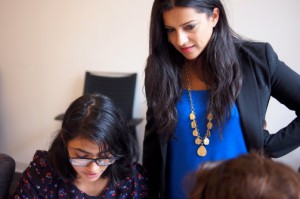Today’s feminists are women of all colors, many from immigrant or struggling families, who wait until 30 or later to develop their dreams, and mentor other women. Ahead of PBS’s documentary ‘Makers: Women Who Make America’ airing tonight, Gail Sheehy updates feminism.
What would Betty Friedan say, 50 years after publishing The Feminine Mystique, if she were to read Stephanie Coontz in The New York Times Sunday Review, writing: “The gender revolution is not in a stall. It has hit a wall”?

Knowing Betty, she would shout for all to hear, “Take to the street!”
Whom would we march against? A Congress that’s learning to love budget-cutting by the guillotine of sequester? And demand what? More government jobs? If the federal government and beleaguered state agencies have to freeze social services, women will be hardest hit, since most are still secretaries, teachers, nurses, and social workers. Government can’t guarantee it will pay for existing entitlements, never mind for a feminist wish list that starts with paid maternity leave and tax relief for family caregivers.
But enough hand-wringing. The feminist spirit still lives! It shows most boldly among younger women from the millennial generation. Now 18 to 34, they were Obama’s most stalwart supporters; 60 percent voted to reelect him; even more among women. They have met the adversity of a near-Depression and developed a different set of expectations and skills from those of their older sisters. In a 2011 Pew survey, two thirds of women 18 to 34 said that “being successful in a high-paying career or profession” was a “very important” or “one of the most important things” in their lives.
Their definition of success goes beyond financial independence. The dream for many millennial women is to make a difference as social or political entrepreneurs. They are using the social media and marketing tools they have mastered to empower less fortunate women and direct them onto career tracks that women have traditionally avoided, like science and technology.
“It’s our obligation to help one another, to sponsor one another, to hire one another, to vote for one another, to uplift one another.”

Today’s young feminists do not flog themselves for not “having it all.” They know that is a fraudulent expectation. Very few women manage to have it all; certainly not all at once. Career-driven millennials are strategic about working obsessively while they are single and earning enough money to afford advanced education. Most are patient enough to wait until 30 or later to develop their dream. It may take until their 40s to find a happy equilibrium between work, love, and family.
How do they do this? Some attach themselves to powerful mentors in their 20s. In their 30s, they are encouraged to stake out a sponsor in a leadership position who will commit to moving them up and out of the sticky marzipan midlevel of corporate or public life. But they must give 80 percent of the effort to make their sponsor look good.
Gen X women already in leadership positions in corporate America are leveraging their power by sponsoring the most dynamic and driven women as successors to “mediocre white men who make a lot of money,” as a female CEO laughingly noted at a recent conference. It was a summit on “The Sponsorship Effect,” chaired by Sylvia Anne Hewlett, an economist who has devoted her career to persuading corporations that it is in their self-interest to coach, mentor, promote, and retain women. Hewlett now has 17 companies supporting her think tank, the Institute for Talent Innovation, including Ernst & Young and Intel. They create sponsorship programs to move able women, including women of color, into leadership positions.
This is the new feminism—women mentoring and sponsoring other women to rise in formerly male hierarchies and branch out into launching their own businesses or inventing new ways to do global good by becoming social entrepreneurs.
Lauren Schulte, for instance, built her own website when she was 12. OK, it was to impress a boy. But by the time she was 15, she was earning $20 an hour helping her father’s friends create their websites. As the eldest of five children, Schulte used her computer skills to work full time for IBM through her college years, where she was mentored by a series of female managers.
“I attribute 100 percent of my success in the workplace to the positive female role models I’ve had there,” says this determined millennial. It took Schulte until she was 25 to finish college, but this set her ahead of her peers in launching a career. At 27, she was happy to forfeit a fat corporate salary to join a nonprofit being pioneered by a young woman social entrepreneur, Leila Janah.
An Indian-American from a modest family, Janah was launching a new model for outsourcing, called microwork. Her company, Samasource, puts poor women to work for above a living wage in the slums of Africa and India as part of an international digital supply chain. As clients, she has attracted no less than Google, Microsoft, and eBay. Since 2010 Samasource has generated $5 million in contracts, which allows Janah to employ 3,500 marginalized young people to perform simple data tasks with only weeks of training. About 75 percent move up to higher-level employment or higher education within one year.
Leila Janah is one of the Young Makers who will be featured tonight in the epic PBS TV documentary, Makers: Women Who Make America. It tells the collective story of the pioneer women who created the most sweeping social revolution in American history and showcases some of their young successors.
The new feminists are not predominately affluent white women with Ivy League credentials and parents who can afford to pay off their college loans. They are women from struggling families, immigrant women, and women of color.
Reshma Saujani is the daughter of immigrants. Her parents were among thousands of Ugandans of Indian descent who were expelled by the monstrous Idi Amin. Saujani’s parents, both engineers, were fortunate to be admitted to the United States, where they were destitute and without a family network that might have cared for them.

Saujani is a woman, now 37, who is small in stature but fearless in taking risks. Hillary Clinton has been her pole star. Saujani met the then-first lady when Saujani was a White House intern in 1997, and worked for her during her presidential campaign. One night at a political event, Saujani was asked at the last minute to introduce candidate Clinton: “I learned how to lead by watching her.” Now, she is running her own unabashed political campaign in New York City to help women—as the city’s public advocate.
“We’re creating our own sisterhood,” she says with a flush of pride. “It’s our obligation to help one another, to sponsor one another, to hire one another, to vote for one another, to uplift one another.”
Her dream of entering public life had to be postponed. Saujani put herself through the University of Illinois and the Kennedy School of Government at Harvard University, and graduated from Yale Law School in 2002. By her late 20s, she was staggering under $200,000 in debt. Like many of her peers, she knew she would need more than a decade to pay off her educational loans.
Dutifully, she went to work for a white-shoe law firm, then became deputy general counsel for a Wall Street investment firm. At 33, Saujani began dragging home to a solitary New York apartment and curling up in the fetal position. But it wasn’t until she smashed her knee skiing that she was forced to slow down and take stock of her life.
Many women enter a major transition in their early to mid-30s. Before the fertility revolution, it was the alarm on the biological clock that rang at about age 35. Today it may be an inner sense of discontent: what’s missing? Suddenly she feels the hole left by the choices of her 20s, which may have been perfectly appropriate to that earlier stage. But now the fit feels different. Some aspects of life with great meaning have been left out. Call it the Passage to Passion. She yearns to do what she loves. Or she is overcome by baby hunger. Or she opens her heart to searching for the right partner in life.
Immobilized on her couch, in physical pain, Saujani surrendered to the Passage yo Passion. What pulled her out of the funk was watching Hillary’s concession speech in June 2008.
“Hillary told us ‘… it would break my heart if, in falling short of my goal, I in any way discouraged any of you from pursuing yours.’ That was the aha! moment for Saujani: “Don’t be afraid of trying and failing.” She dragged herself to the phone and called her father. He had always supported her aspirations.
“I want to quit,” she blurted. “I want to run for office.” As a practicing Hindu, she knew her father would understand when she told him it was time to follow her dharma, “what I was put on this earth to do.” He gave his blessing.
She was the first Indian-American woman to run for Congress. Saujani took on a popular incumbent in the Silk Stocking district of Manhattan’s Upper East Side, Congresswoman Carolyn Maloney. At the same time, she was dating an Indian man who seemed open to an egalitarian partnership. Nihal Mehta asked her three times to marry him. She insisted they go through the long campaign together to test the impact of her dharma on their relationship.
“I didn’t get married till I was 36,” says Saujani. With last November’s election approaching, she kicked up the tempo of her already frenetic campaign, running between hundreds of events. She couldn’t let down her family and supporters, most of whom had scraped together the money to contribute. Mehta was founding his own startup and wildly busy. To make their union legal, the couple had to go to City Hall and sign a marriage certificate. Appointments came and went. One or the other kept canceling—three times, five, 10; it was becoming a joke.
Finally, Saujani went on the Internet and found that an officiant could be hired to come to them. Her assistant, Charlotte Stone, set up the ceremony at the Nomad Hotel in Chelsea, midway between the couple’s two offices.
“Are you coming to your wedding?” was the urgent text from her assistant. Saujani sprinted up the stairs of the hotel in her jeans and boots, hair flying and nails a disgrace, signed the papers, kissed her mate, downed a glass of wine, and the whole ceremony was over in 10 minutes.
She knew she had made the right marriage when she lost the election, miserably. Her new husband bought her a puppy. And Saujani threw a failure party. “I refuse to see losing as a negative,” she says. “Obama lost in ’83 when he ran against Bobby Rush. Hillary lost in ’08. Even Lincoln lost the first election. It’s a useful learning experience.”
A solid opportunity immediately opened up. She was asked by the New York City public advocate, Bill de Blasio, to be his deputy. That allowed her to start a program, Girls Who Code, to teach underprivileged junior high school girls how to write for computers. Saujani wants to prepare them for jobs of the future. By 2020 there will be 1.4 million job openings for computer specialists. This summer, she will have 180 girls in the coding program, mostly eighth graders, and 89 will enter a partnership program with Cornell Tech, the first engineering campus in the city. In New York the median wage for careers in technology is $88,000. “The girls we teach have the aptitude, and they can get a job right out of high school,” she says. “It will change their whole perspective on life.”
This spring, Saujani is running to take over de Blasio’s job as public advocate while he runs for mayor. Her first book—to be published in April by Amazon and entitled Women Who Don’t Wait in Line—is intended to ignite women to take risks, learn from failure, and reach for the next higher job, as Saujani believes “this is the way we will remake America.”


0 Comments